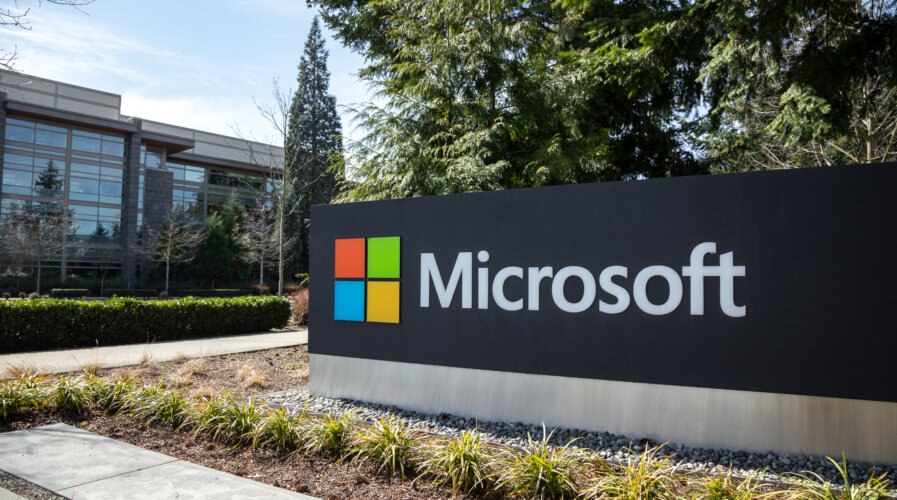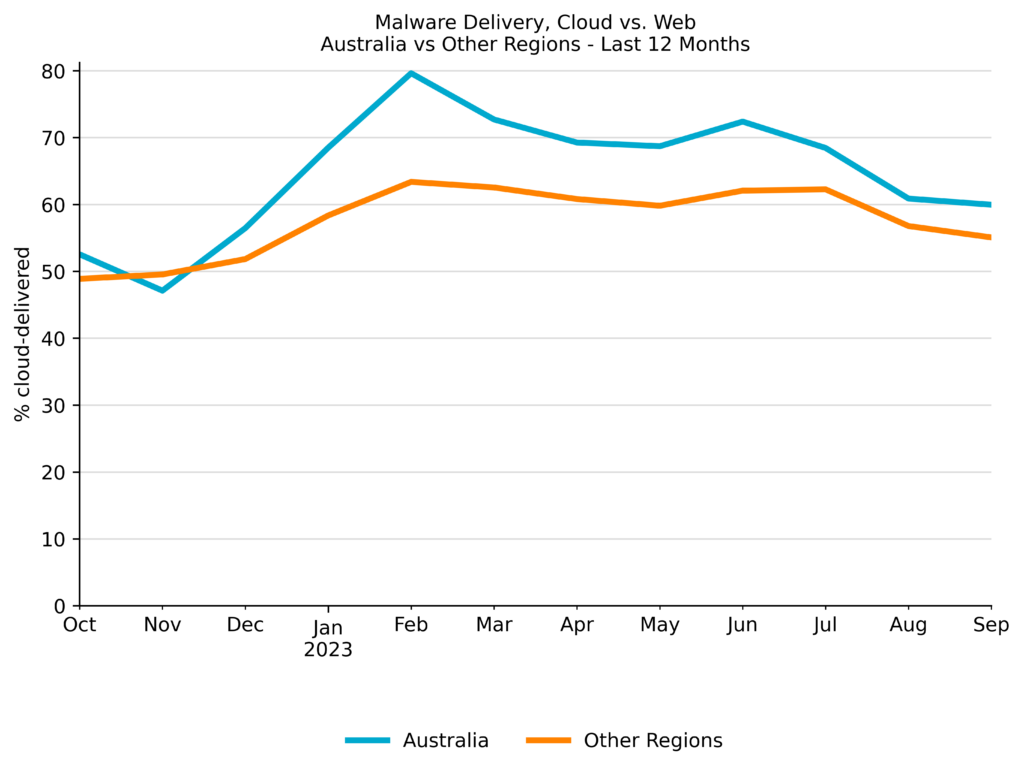
Microsoft and Australia team up in a AU$5 billion cyberdefense strategy. (Source – Shutterstock)
The AU$5 billion pledge from Microsoft to reinforce Australian cybersecurity
- Microsoft pledges AU$5 billion for Australian cybersecurity.
- This move aims to boost defenses amid rising cyberthreats and cloud malware.
- The Microsoft cybersecurity funding is expected to boost Australia’s digital nation status.
The importance of robust cybersecurity and advanced technological infrastructure cannot be overstated as the digital world increasingly intertwines with our everyday lives. Emphasizing this critical need, Microsoft has recently declared a plan that could transform the technological landscape of Australia, marking a significant milestone in the country’s journey towards digital security.
In a strategic move to bolster its technological influence and commitment in Australia, Microsoft announced an additional AU$5 billion investment over the next two years. The Guardian reported that this significant expansion in hyperscale cloud computing and collaboration with the Australian Signals Directorate (ASD) is intended to reinforce Australia’s cyberdefense mechanisms, an urgent requirement in the current global digital scenario.
Microsoft showcases strategic cybersecurity commitment in Australia
Australian Prime Minister Anthony Albanese unveiled this pivotal financial commitment during his inaugural state visit to the United States. The announcement, symbolizing a strengthening of Australia-US tech ties, was made at the Australian embassy in Washington, DC. The event saw key figures such as Microsoft’s vice chair, president Brad Smith, and Steven Worrall, the managing director of Microsoft Australia and New Zealand, standing alongside the Prime Minister.
This major announcement from Washington heralds the Albanese government’s upcoming detailed presentation of a revamped national cybersecurity strategy. This strategy, spanning until 2030, aims to create a comprehensive roadmap to safeguard Australia’s digital ecosystem. The anticipated release of this strategy in the next few weeks will mark a significant milestone in Australia’s commitment to bolstering its cyberdefenses.
The Prime Minister’s day in Washington began with a reflective and poignant tribute at the Arlington National Cemetery’s Tomb of the Unknown Soldier, a gesture symbolizing the deep military and historical connections between Australia and the US. His visit also included visits to the graves of two Australians, followed by the afternoon’s more upbeat engagement – confirming the substantial Microsoft cybersecurity investment back at the embassy.
In its strategic collaboration with the Australian government, Microsoft’s focus extends to intensifying measures against cyberthreats that are increasing in frequency and complexity. Both entities aim to identify, prevent, and respond to these digital security challenges by enhancing their joint capabilities.
The formal statement of Microsoft’s cybersecurity investment emphasized that its efforts to combat cyberthreats involve an exchange of crucial cyberthreat intelligence. This collaboration is vital to secure Australia’s governmental networks and equally crucial in safeguarding its citizens and businesses. By concentrating on detecting, analyzing, and defending against intricate cyberthreats from nation states, Microsoft is stepping up its commitment to national security.
Rachel Noble, the director general of ASD, underscored the significance of Microsoft’s investments as a pivotal enhancement to its strong partnership. She noted that these developments are set to ‘turbocharge’ their combined capacities, providing a more robust defense against cyberthreats and enhancing security measures for all Australians in the digital domain.
A troubling statistic from the Australian Cyber Security Centre’s recent threat report indicates that cyber-incidents are alarmingly frequent in Australia, with a reportable incident happening every seven minutes. In the fiscal year 2021-22, the country faced over 76,000 cybercrime instances, highlighting the urgency for strengthened cybersecurity measures.
Australians top global list in malware downloads from cloud apps
Adding to these concerns, Netskope, a leader in secure access service edge (SASE), disclosed recent alarming trends that showed widely used cloud applications have unexpectedly become primary channels for delivering malware to Australian companies and their employees. This conclusion was drawn from anonymized data analysis, revealing that Australian users are particularly vulnerable to downloading malware-infected files from these cloud platforms compared to their global counterparts.
Between October 2022 and September 2023, there was a notable jump in malware delivery via cloud services in Australia, which accounted for 64% of all malware transmissions via web protocols. This figure starkly contrasts with the global average of 56%, highlighting a specific and growing threat landscape in the Australian digital environment.

Malware delivery over web protocols in Australia. (Source – Netskope)
The last few years have seen Australian organizations rapidly embrace digital transformation, adopting cloud-based business solutions at a remarkable rate. This surge has positioned Australia at the forefront of global cloud adoption and usage. Australian employees, on average, have utilized 30 different cloud applications monthly over the past year, significantly more than the global average of 22, reflecting a deep integration of cloud services in their daily operations.
Despite these advances in cloud computing, this widespread adoption has inadvertently opened new avenues for cybersecurity threats. Malicious actors increasingly exploit trusted cloud platforms to distribute malware to unsuspecting Australian businesses, potentially leading to substantial data breaches.
Cybercriminals are exploiting Australian workers’ routine use of trusted cloud business applications to disseminate malware. Frequently used platforms such as OneDrive, Sharepoint, Github, Weebly, and Outlook.com have become the most exploited for malware downloads within Australia. This tactic allows attackers to bypass traditional security defenses, which tend to focus on domain block lists and URL filtering, and often overlook cloud-based traffic.
Netskope’s analysis in Australia identified trojans, which comprised 76% of the malware detected, as a predominant tool for attackers seeking to infiltrate networks. These trojans serve as a gateway for further deployment of various types of malware, including infostealers, remote access trojans, backdoors, and ransomware, indicating a sophisticated and multi-layered threat environment.
In light of the escalating cyberthreats, Prime Minister Albanese welcomed the Microsoft-ASD alliance as a critical move to shield the nation’s economy from digital threats. This collaboration is an essential foundation for a robust, secure economy, addressing an ever-evolving landscape of cybersecurity challenges.
Enhancing cybersecurity skills and infrastructure
Albanese further emphasized that the Microsoft cybersecurity investment was a significant contribution towards nurturing future skills and workforce in Australia. This initiative is expected to fortify Australia’s standing as a leading global economy, ready to tackle future challenges and seize opportunities in the tech domain.
Microsoft’s project to increase Australia’s cloud computing capacity by approximately 250% over the next two years is designed to meet the surging demand for cloud services. This initiative will let Microsoft use cutting-edge AI technology, unlocking vast economic and productivity benefits for Australia. Though the announcement received mixed reactions from the public – such as from the X community.

Mixed reactions from the public regarding this announcement. (Source – X)
Complementing this, Microsoft is committed to enhancing the skills of an additional 300,000 Australians through its global skills initiative. Furthermore, the company is gearing up to launch its inaugural Datacentre Academy in Australia by early 2024, in collaboration with TAFE NSW, aiming to impart vital technical and operational skills.
This new funding initiative represents Microsoft’s most significant investment in its 40-year history in Australia, marking an important milestone in its longstanding commitment to the Australian market.
Steven Worrall, elaborating on this investment, noted that the proposed infrastructure, skills development, and cybersecurity investments are aimed at building upon Microsoft’s enduring legacy in Australia. These initiatives strategically focus on securing a safe and dynamic digital economy, setting the stage for innovative growth and advancement in the AI-driven future.
READ MORE
- Safer Automation: How Sophic and Firmus Succeeded in Malaysia with MDEC’s Support
- Privilege granted, not gained: Intelligent authorization for enhanced infrastructure productivity
- Low-Code produces the Proof-of-Possibilities
- New Wearables Enable Staff to Work Faster and Safer
- Experts weigh in on Oracle’s departure from adland






